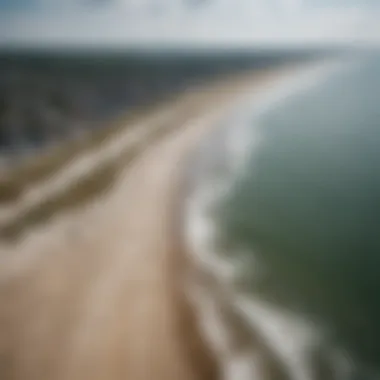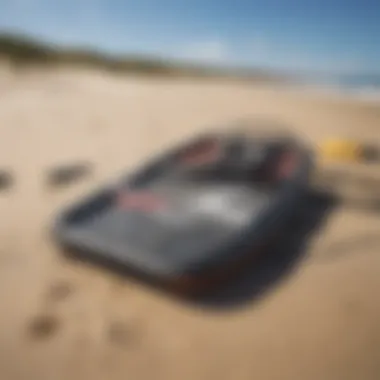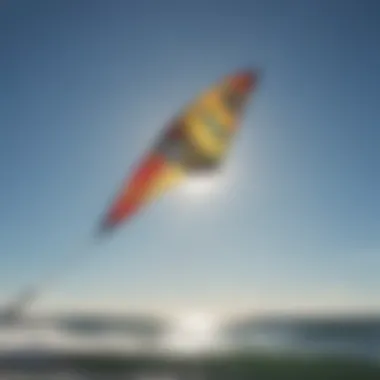Mastering Jones Beach Tides: Expert Guide for Kitesurfing Enthusiasts


Equipment Reviews
Kitesurfers and kiteboarding enthusiasts are constantly seeking the latest advancements in kite models to enhance their riding experience. Understanding the nuances of kite shapes, sizes, materials, and brands is crucial. Manufacturers are continually innovating to improve performance, offering a range of options tailored to different riding styles and conditions. Riders must carefully select a kite that suits their skill level and desired riding experience, ensuring optimal performance on the water.
Kites
When delving into the realm of kites, riders encounter a myriad of options, each tailored to specific riding preferences and conditions. From delta kites to hybrid shapes, the versatility of kite designs allows riders to adapt to varying wind conditions. Materials such as ripstop nylon and polyester ensure durability and performance, while features like bridle systems and depower mechanisms enhance control and safety on the water. It is essential for riders to grasp the importance of choosing the right kite for their skill level and intended riding style to maximize their time on the waves.
Boards
Kiteboarding boards play a pivotal role in a rider's performance on the water. Whether opting for a twintip or directional board, each design offers unique advantages for different riding styles. Twintips cater to freestyle riders, providing superior maneuverability and versatility, while directional boards excel in wave riding and carving. Factors like board length, width, flex, and construction impact stability, control, and responsiveness on the water. Riders must select a board that aligns with their riding goals and preferences to elevate their kiteboarding experience.
Accessories
In the realm of kiteboarding, accessories are vital components that enhance safety and performance on the water. Harnesses, lines, pumps, and safety gear are indispensable accessories that riders rely on for a seamless experience. Harnesses provide comfort and control during rides, while high-quality lines ensure secure connections between the kite and rider. Integral safety gear like helmets, impact vests, and safety leashes protect riders in case of emergencies. Understanding the significance of each accessory and investing in reliable gear is paramount for a safe and exhilarating kiteboarding experience.
Understanding Tides at Jones Beach
Understanding Tides at Jones Beach plays a pivotal role in enhancing the kitesurfing and kiteboarding experience at this location. As kitesurfing and kiteboarding heavily rely on wind and water conditions, having a profound grasp of the tidal movements at Jones Beach is indispensable. By comprehending the intricacies of tides, enthusiasts can strategically plan their rides and leverage optimal conditions for an exhilarating experience. Knowledge about tides empowers riders to navigate the waters seamlessly and make informed decisions based on the prevailing tidal patterns.
Introduction to Tidal Movements
Gravity's Influence on Tides
Gravity's impact on tides constitutes a fundamental aspect of tidal movements at Jones Beach. The gravitational forces exerted by celestial bodies, primarily the moon and the sun, play a significant role in shaping the tides. These gravitational pulls create bulges in the Earth's water bodies, resulting in the cyclic rise and fall of tides. Understanding the gravitational influence on tides enables riders to anticipate tidal changes and adapt their riding strategies accordingly. By discerning how gravity orchestrates the ebb and flow of tides, enthusiasts can maximize their time on the water and harness the natural forces to their advantage.
Factors Affecting Tidal Changes
Various factors contribute to the dynamic nature of tidal changes at Jones Beach. Factors such as the topography of the seabed, coastline configuration, and geographical location can influence the amplitude and timing of tides. Wind patterns and atmospheric pressure also play a role in modulating tidal behavior. By delving into the nuances of these factors, riders can decipher the complex interplay that governs tidal variations. Recognizing the multifaceted influences on tidal changes equips enthusiasts with a comprehensive outlook, allowing them to anticipate and adapt to the ever-shifting tidal dynamics effectively.


Types of Tides in Jones Beach
Diurnal Tides
Diurnal tides, characterized by a single high tide and low tide in a day, manifest a distinct tidal pattern at Jones Beach. This tidal variation presents riders with unique riding conditions, offering opportunities for extended sessions during specific parts of the day. Understanding the rhythmic nature of diurnal tides enables enthusiasts to plan their kitesurfing or kiteboarding excursions efficiently, making the most of the prevailing tide cycle.
Semidiurnal Tides
Semidiurnal tides, featuring two high tides and two low tides of similar height within a day, present a symmetrical tidal pattern at Jones Beach. The regularity of semidiurnal tides provides riders with predictable tidal transitions, allowing for consistent riding experiences throughout the day. By grasping the periodicity of semidiurnal tides, enthusiasts can leverage the recurring tidal cycles to optimize their time on the water and enhance their overall riding proficiency.
Mixed Tides
Mixed tides, combining characteristics of both diurnal and semidiurnal tides, introduce a varied tidal pattern at Jones Beach. This hybrid tidal regime results in irregular tide heights and timings, offering riders a diverse set of challenges and opportunities during their riding sessions. Familiarizing oneself with the complexities of mixed tides equips enthusiasts with adaptability and versatility, enabling them to navigate the waters skillfully and engage dynamically with the changing tide scenarios.
Tidal Range Variation
Spring Tides vs. Neap Tides
The distinction between spring tides and neap tides showcases the amplitude contrast in tidal ranges at Jones Beach. Spring tides, occurring during the full moon and new moon phases, exhibit the greatest tidal range, leading to higher high tides and lower low tides. In contrast, neap tides, transpiring during the first and third quarter moon phases, display minimal tidal ranges with less disparity between high and low tides. Understanding the fluctuations between spring and neap tides enables riders to anticipate the intensity of tidal currents and tailor their riding strategies accordingly. By discerning the nuances between these tide types, enthusiasts can capitalize on the varying tidal ranges to augment their kitesurfing and kiteboarding experiences to Noa.
Optimizing Kitesurfing and Kiteboarding Activities
In this article, an essential focus falls on optimizing kitesurfing and kiteboarding activities. Understanding the nuances of this optimization can significantly enhance the overall riding experience. By carefully considering factors such as tide conditions, wind dynamics, and equipment setup, enthusiasts can elevate their performance to new levels. Optimizing kitesurfing and kiteboarding activities is not merely about skill but also about attaining an intricate understanding of the environment to harness its power effectively.
Ideal Tide Conditions for Riding
High Tide vs. Low Tide
When discussing high tide versus low tide, a crucial aspect to consider is how the water levels impact the riding experience. High tide provides deeper waters, allowing riders to access areas that may be inaccessible during low tide. This aspect presents opportunities for more dynamic maneuvers and longer rides. On the other hand, low tide exposes shallow areas, which might require riders to adapt their techniques to navigate safely. Understanding the distinct characteristics of high and low tides enables kitesurfers and kiteboarders to plan their sessions strategically, depending on their skill level and preferences.
Understanding Slack Tide


Slack tide, being the period between incoming and outgoing tides, offers a unique window where water movement slows down, resulting in calm waters. This momentary pause in tidal activity can be advantageous for riders looking to practice tricks or techniques that require steady conditions. While slack tide may not provide the same adrenaline-pumping experience as high-tide rides, it offers a serene environment for skill development and experimentation. Riders can utilize this phase to refine their moves without battling strong currents or excessive chop, ultimately contributing to their overall progress in the sport.
Safety Considerations
Rip Current Awareness
Rip currents pose a significant risk to water sports enthusiasts, including kitesurfers and kiteboarders. Understanding how rip currents form and recognizing their telltale signs are essential for ensuring rider safety. By being aware of potential rip currents at Jones Beach, riders can effectively avoid dangerous areas and prioritize staying within safe zones. This heightened awareness plays a crucial role in mitigating the risks associated with strong currents and turbulent waters, allowing riders to enjoy their sessions without compromising their well-being.
Impact of Tidal Changes on Riding
The impact of tidal changes on riding cannot be understated. As tides shift, water depth and flow patterns fluctuate, directly influencing the riding experience. These changes can affect navigation, wave quality, and overall ride dynamics. Riders must adapt to these shifts by adjusting their riding strategies accordingly. Being mindful of how tidal variations alter the water conditions is paramount for a safe and enjoyable kitesurfing or kiteboarding session.
Equipment Adjustment for Tidal Variations
Board and Sail Selection Tips
Choosing the right board and sail based on tidal variations can make a significant difference in the riding experience. Factors like board size, fin setup, and sail rigging play integral roles in maximizing performance in different tide conditions. Understanding how to adjust equipment settings based on tidal variations can optimize efficiency and control while on the water. By incorporating tailored adjustments, riders can adapt to changing conditions seamlessly, ensuring a more versatile and enjoyable kitesurfing or kiteboarding session.
Exploring Jones Beach Tide Charts
In the extensive manual focusing on Jones Beach tides for kitesurfing and kiteboarding fanatics, the section on exploring tide charts emerges as a crucial component. Dive deep into the realm of tide charts to unveil the intricate details that dictate the ideal moments for riding the waves. Understanding the nuances of tide charts can significantly enhance your experience on the water, allowing you to harness the power of the tides effectively. Decrypting the data presented through these charts enables riders to make informed decisions in line with the ever-shifting aquatic conditions.
Importance of Tide Charts
Unraveling the mysteries within tide charts offers a window into the pulsating rhythm of the ocean. 'Interpreting Tide Data' stands out as an indispensable skill, shedding light on the cyclical nature of tides. By deciphering these patterns, riders can navigate the waters with precision, optimizing their kiteboarding escapades. The significance of 'Interpreting Tide Data' lies in its ability to forecast the ebb and flow of the tides, providing riders with a strategic advantage in choosing their riding times. While challenges may arise, mastering this art equips enthusiasts with a competitive edge, elevating their overall performance.
Delving into the realm of 'Utilizing Tide Charts Effectively' elevates riders' capabilities to harness the power of the tides. This segment accentuates the practical application of tide charts, offering a roadmap to synchronize one's kitesurfing or kiteboarding sessions with the tidal shifts. The seamless integration of tide chart insights empowers enthusiasts to adapt dynamically to changing conditions, culminating in a heightened riding experience. Despite complexities inherent in this process, the rewards manifest in enhanced control and proficiency amidst the waves.
Online Resources for Tide Information


Amidst the digital landscape, 'Recommended Websites and Apps' emerge as beacons of knowledge for enthusiasts navigating Jones Beach tides. These virtual platforms serve as reservoirs of valuable data, catering to riders' insatiable thirst for tide-related insights. By tapping into these resources, individuals can augment their understanding of tide dynamics, unlocking new dimensions of their riding potential. The strategic utilization of 'Recommended Websites and Apps' not only streamlines information access but also fosters a sense of community among riders striving for excellence in kite sports. Embracing these tools amplifies the learning curve, propelling enthusiasts towards mastery in their nautical endeavors.
Creating Your Own Tide Observations
The realm of 'Tracking and Analyzing Tidal Patterns' invites enthusiasts to embark on a personal odyssey of discovery within the tides. By cultivating a knack for scrutinizing tidal movements, riders nurture a profound connection with the oceanic symphony that dictates their pursuits. This meticulous observation unveils insights that transcend conventional wisdom, granting individuals an edge in predicting and adapting to tidal fluctuations. The essence of 'Tracking and Analyzing Tidal Patterns' lies in unlocking the wealth of knowledge hidden within the tides, enabling riders to tailor their strategies with finesse. While challenges may punctuate this exploration, the rewards are manifold, positioning enthusiasts on a trajectory towards tideswept excellence.
Practical Tips for Tidal Riding Success
In the realm of kitesurfing and kiteboarding at Jones Beach, mastering the practical tips for tidal riding success is paramount for enthusiasts aiming to elevate their skills and experience. These tips serve as the guiding compass amidst the dynamic tides, ensuring a safe and exhilarating ride. By understanding the interplay between wind and tides, riders can harness these elements to their advantage, navigating the waters with finesse and control. Key elements of practical tips include identifying optimal tide conditions, adjusting equipment accordingly, and staying vigilant towards changes in wind direction and tidal currents. These insights not only enhance performance but also contribute to a seamless and enjoyable riding experience, reflecting the essence of expertise and dedication within the kitesurfing community.
Monitoring Wind-Tide Interplay
Wind Direction Impacts
Delving into the nuanced interplay of wind direction impacts provides kitesurfing and kiteboarding enthusiasts with a strategic advantage in exploiting favorable conditions at Jones Beach. Understanding how wind direction influences tidal movements is pivotal in determining the ideal spots and times for a thrilling ride. Factors such as onshore winds offering enhanced lift for jumps or offshore winds providing smoother water conditions come into play, shaping the overall riding experience. By leveraging wind direction impacts effectively, riders can optimize their performance, adapt to changing environments, and elevate their skill set, embodying a proactive approach towards mastering the waves of Jones Beach.
Optimal Wind-Tide Combinations
As riders seek the optimal wind-tide combinations for an unparalleled kitesurfing or kiteboarding experience, the significance of selecting the perfect blend cannot be understated. Combining favorable wind direction with tidal movements is a delicate art that ensures riders ride with the wind rather than against it. The synergy between wind and tides influences water surface textures, wave heights, and overall stability, shaping the dynamics of each ride. Embracing optimal wind-tide combinations empowers enthusiasts to ride with confidence, grace, and efficiency, epitomizing the harmonious fusion of nature and skill on the vibrant waters of Jones Beach.
Navigating Tidal Currents
Strategies for Efficient Navigation
Exploring the strategies for efficient navigation amid Jones Beach's tidal currents furnishes riders with a comprehensive toolkit to conquer the shifting waters with precision and finesse. By employing strategic maneuvers and leveraging tidal flows, riders can traverse the currents effectively, optimizing their energy output and route selection. Understanding the ebb and flow of tidal currents enables riders to choose the most efficient paths, anticipate obstacles, and adjust their riding technique accordingly. With strategic navigation strategies in place, kitesurfing and kiteboarding enthusiasts can imbue their rides with fluidity, control, and strategic prowess, enriching their aquatic endeavours at Jones Beach.
Conclusion
In wrapping up this substantial discourse on Jones Beach tides tailored for kitesurfing and kiteboarding aficionados, we underscore the pivotal role that the conclusion plays in this meticulously crafted narrative. The crux of the matter lies in distilling and assimilating the intricate details of tidal movements and their impact on riding experiences. By comprehending the nuances of tides at Jones Beach, readers can elevate their prowess on the waves to unprecedented levels, harnessing the power of gravitational forces and environmental factors to their advantage. The zenith of success in kitesurfing and kiteboarding is contingent upon mastering the ebb and flow of tides, a feat that can only be achieved through a holistic understanding of the ocean's rhythms.
Mastering Jones Beach Tides
Integration of Tide Awareness into Riding
Delving deeper into the realm of kitesurfing and kiteboarding, the integration of tide awareness into riding emerges as a quintessential element for enthusiasts seeking to conquer the waves at Jones Beach. This pivotal aspect revolutionizes the riding experience by instilling a profound cognizance of tidal behaviors and their interaction with wind dynamics. By incorporating tide awareness into their skill set, riders can fine-tune their strategies in response to tidal shifts, ensuring optimal performance and safety on the water. The strategic alignment of tide awareness with riding proficiency not only amplifies the thrill of the sport but also fosters a deeper connection with the aquatic environment.
The key characteristic of integrating tide awareness into riding lies in its transformative influence on rider adaptability and responsiveness to changing marine conditions. This symbiotic relationship between tide awareness and riding proficiency empowers enthusiasts to navigate the waters with unparalleled agility and foresight, maximizing the potential for exhilarating, yet safe, experiences. The intrinsic value of this strategic amalgamation resides in its capacity to nurture a harmonious equilibrium between rider skills and natural elements, culminating in a symbiotic dance between human ingenuity and oceanic forces. While challenges may arise in synchronizing tide awareness with riding techniques, the inherent rewards of enhanced performance and sensory immersion make this integration a compelling choice for kitesurfing and kiteboarding enthusiasts committed to mastering Jones Beach tides.







